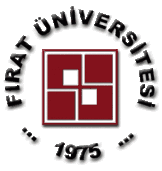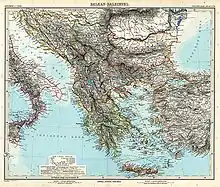Fırat University
Fırat University is a state university based in Elazığ, Turkey. The university was founded in 1975 and named after the Turkish name of the Euphrates River which originates near Elazığ. Being one of the major academic institutions in the Eastern Turkey, the university has twelve schools, four institutes, one state conservatory, three vocational high schools and twenty one research centers with a strong emphasis on scientific and technological advancement and research.
Fırat Üniversitesi | |
 University Seal | |
Former names | Elazığ Technical College, Elazığ State Academy of Engineering and Architecture |
|---|---|
| Type | Public |
| Established | 1975 |
| Rector | Prof. Dr. Kutbeddin Demirdağ |
Academic staff | 1,134 |
Administrative staff | 339 |
| Students | 31,361 |
| Undergraduates | 29,164 |
| Postgraduates | 1,682 |
| 515 | |
| Location | , |
| Campus | Urban |
| Language of Education | Turkish and English |
| Colors | Burgundy and White |
| Website | www |
History
Initially opened as Elazığ Technical College in 1967, and renamed as Elazığ State Academy of Engineering and Architecture, Fırat University was established and gained its current name in 1975 with the School of Veterinary Medicine making up the core program and structure of the university. The School of Veterinary Medicine which was founded in 1970 as a distant school of Ankara University Elazığ, still continues to be one of the best veterinary schools in the country. With the opening of the university, the School of Arts and Sciences was created and The Academy of Engineering and Architecture was restructured and renamed as the School of Engineering. School of Medicine and School of Technical Education were established in 1983, followed by the School of Fisheries in 1992, the School of Education in 1998 and School of Communication in 2001.
Faculties
- Faculty of Education
- Faculty of Communication
- Faculty of Sciences and Letters
- Faculty of Economics and administrative Sciences
- Faculty of Theology
- Faculty of Communication
- Faculty of Engineering
- Faculty of Fisheries
- Faculty of technical Education
- Faculty of Technology
- Faculty of Medicine
- faculty of Veterinary Medicine
Faculties
- Faculty of Engineering
- Department of Bioengineering
Department of Mechanical Engineering
Department of Mechanical Engineering is one of the first departments established with Department of Civil Engineering in 1967. With a history stretching back over 34, students, research studies of academic stuff and local industries have been served with the Manufacturing and Machine tools Lab, Internal Combustion Engineer Lab, Mechanic Lab, Mechanism and Machine Design Lab, Material Lab, Materials Lab, Measurement Lab, Heat Transfer Lab, Heat Technique Lab, Fluid Mechanics Lab and Hydraulic Mechanics Lab. Department of Mechanical Engineering continues activities of education training and researches by using all possibilities of the modern technology with its building total usage area of around 6,450 m² consisting of two blocks, each of them has classrooms, offices and laboratories.
Main Branches
- Thermodynamics
- Mechanics
- Energy
- Construction
- Machine Theory
- Manufacturing
- Dynamics
Department of Electrical and Electronics Engineering
The department is in the engineering campus and is the closest building to the student residents. The department has largest cafeteria at the engineering campus. It has 8 lecture rooms and 5 large Labs, which permit a range of experimental studies and provide essential support for both undergraduate and postgraduate students. The students have facilities to access to internet and there are several PCs and Labs to use for both computer aided study design and final year projects.
Electrical and electronic engineering continue to be buoyant industries, as indicated by the current demand for graduates. The School’s 4-year Eng course is designed to qualify students for careers in a wide range of industries, as well as in government and commercial organizations. These typically embrace electrical energy production, electrical drives and power electronics, electronic hardware and software, automation, robotics and control, communications, radio and television. 14 lecturers and 13 research assistants direct research and education in the department. Three technicians work in the labs as full-time.
Project work throughout the course underpins the necessity for a combination of practical and theoretical skills and abilities. In spring term of third year, the students are compulsory divided into four groups according to their interest areas after their graduation. These groups are: Power Electronics and Machines, Electronics and Telecommunication, Power Systems, Control and Computers. Each group takes intensive various courses as well as common courses. In the department there are five groups as listed below:
- Circuit
- Systems
- Power Systems
- Electrical Machines
- Electronics
- Telecommunication
Department of Industrial Engineering
Department of Civil Engineering
Department of Civil Engineering, which was established at 1967 together with Mechanical Engineering, is one of the two oldest departments of College of Engineering. The department gained the capability of carrying out courses and practices by only its own faculty members, which were carried out by the faculty members of Middle East Technical University and Istanbul Technical University at earlier ages, throughout the development over 40 years. During this period, the technical facilities, laboratories, and equipment owned by the department have reached to an essential level for a contemporary education.
Education is given in an independent building of Civil Engineering, with a total residential area of 3,276 m². Department facilities consist of five classrooms (975 m²), two laboratories (508 m²), a classroom equipped with 25 computers, and a two-storey service building in which the faculty and administrative members officiate. There is also a three-storey laboratory (including office rooms for faculty members and laboratories for research and practice with a total area of 3,400 m²) for Hydraulics Division, which was laid on foundation on October 1995 and was started service at Fall Semester of 1998-1999 academic calendar. The Hydraulics Laboratory was equipped by using the British Loan in 1995.
Department of Food Engineering The department offers education at both undergraduate and graduate levels (M.S. and Ph.D.). The graduate programme aims to provide more depth and breadth to the undergraduate background of the students in different phases of food engineering such as food science and food technology.
Department of Software Engineering
Department of Computer Engineering
Our department was founded in 1995. There are 16 Academic Staff within the department. The number of the students in our department is 350. There are Master and PhD programs for our department.
Department of Chemical Engineering
The Department of Chemical Engineering offers courses with laboratory training leading to the degrees of Bachelor of Science (BSc), Master of Science (MSc) and Doctor of Philosophy (PhD). The courses are designed with consideration of the modern concepts of chemical engineering education and new requirements of the industry. The core curriculum provides a background in basic sciences, engineering sciences and economics to enable the graduates to be leading contributors to several interdisciplinary areas. In the light of these principles, the department of chemical engineering has prepared courses and set-up laboratories to serve undergraduate and graduate students. In the first two years, the undergraduate students take the general and fundamental engineering courses, such as chemistry, calculus, physics, material science etc.
In the last two years, however, the majority of courses are based on the chemical engineering areas. Along with the academic training composed of compulsory courses and 18 elective courses, the students are also required to participate in minimum 40 days industrial summer practicing program, in areas approved by the department, following the second and third years.
Education and teaching at the department are carried out by 20 members:
- 7 professors
- 2 associate professors
- 5 assistant professors
- 2 specialists
- 8 assistants
Major scientific divisions of the department are
- Chemical Technology
- Process
- Unit Operation
- Thermodynamics
- Reactor Design
Department of Mechatronics Engineering
Department of Environmental Engineering
Our department was founded in 1989. There are 16 Academic Staff within the department.
Department of Geological Engineering
Our department was founded in 1977. There are 25 Academic Staff within the department.
Research opportunities
Fırat University has been trying to develop computers, ballistics search, inertial guidance in connection with defense research during the last twenty years. In the past 20 years, Fırat University's educational programs have expanded beyond the physical sciences and engineering into social sciences like economics, linguistics, political science, medical science, dental surgery, architecture and management. Fırat University is characterised by its unique study and research opportunities. Social issues can be studied in the real-life-lab setting of East Anatolia. Major specific location allows in research the results of which are of great international interest. Our approach in research and teaching is proceeding systematically and integrating sustainability right from the start.
Main research areas determining our profile are the environment, material, construction, and information/communication technology, ballistics search and social sciences.
Libraries
Fırat University Libraries have including the different parts like physical sciences, medical sciences, engineering resources, social sciences, economics, philosophy, linguistics, political science and management. In addition several academic departments also have their own libraries.Fırat university has at least one hundred thousand book in its own library.
Facilities
Fırat University has a Youth and Sports Club, Aviation Club, Theatre Branch, Folk Dances Group, Mountaineering Branch, and many other social, cultural, scientific and sports clubs. An objective of the University is to develop international links.
Since 2006, when Firat University signed its first institutional contract within the Erasmus Programme for student exchange, 1,813 students and 415 teaching staff have visited EU countries, and the University has received 374 students for one or two semesters. For the 2011 academic year th University has bilateral agreements with 183 universities in 15 European countries.
Accommodation
The majority of accommodation is within walking distance of the campus. There is mass housing, including 304 flats for academic and administrative staff, and private dormitories for students. Accommodation for each Erasmus student costs 50 euros/month.
Affiliations
The university is a member of the Caucasus University Association.[1]
References
- Tüm Uyeler. kunib.com
